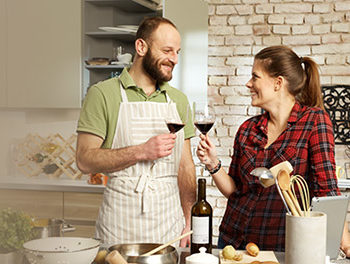Oysters. Chocolate. Chillies. If asked, most people could probably name at a least a few ‘aphrodisiac foods.’ But is there any meat to these claims? Or is the concept of a libido-boosting menu simply an old wives’ tale? We’ve sunk our teeth into the science behind 10 popular aphrodisiac assertions to find if food really can get you in the mood.
The long history of libido-boosting cuisine
In Ancient Greece, Hippocrates advised that lentils were the food to promote potency.1 In the Late Middle Ages, scholars believed that warm, moist foods like egg yolks could enhance amorous feelings (while cold foods like cucumber would ‘’extinguish lust’’).2 And, to increase his virility, legendary lover Casanova is said to have routinely breakfasted on as many as 50 oysters at a time.3
Quick look: the truth behind 7 popular aphrodisiac foods
Throughout history, humankind has had an ongoing love-affair with romantic dinners and aphrodisiac foods, with everything from sparrow brains to potatoes being championed as the perfect fare to give would-be lovers a boost in the bedroom.4 Even today we’re not immune: foods like chocolate go hand in hand with love, and commonly touted aphrodisiacs include everything from oysters to alcohol.
But do any of these aphrodisiac foods actually work? We looked at the scientific evidence for and against 10 popular aphrodisiacs to find out whether there is a dish that can truly be called ‘the food of love’ – or whether these erotic eats are really just big plates of placebo.
Can aphrodisiac foods be a recipe for love?
So, with all the scientific analysis examined, can we say that aphrodisiacs work? And, if so, what are the best aphrodisiac foods?
It’s safe to say that aphrodisiac evidence is…inconclusive. We can probably rule out some contenders like chocolate, while other foods like oysters, vanilla, coffee and pomegranate need further study. Some studies do look promising, such as those for watermelon, asparagus, chilies, red wine and ginseng. However – and it’s a big however – even the most promising foods are not guaranteed aphrodisiacs.
For starters, the majority of these foods are not aphrodisiacs in the traditional sense – they don’t instantly raise libido and improve performance. The benefits, if any, mostly come from moderate, regular intake over time. Secondly, many of the claims are based on small-scale studies: it’s no sure thing that the results would be the same for everyone.
Finally (but perhaps most importantly), many of the highest-ranking aphrodisiac foods are fruits and vegetables. Yes, they might have ingredients that can enhance sexual health, but so do many other plant-based, ‘healthy’ foods. Perhaps the sensible conclusion then, is that the best libido-booster of all is to eat healthily and live an active lifestyle.
The power of the placebo
However, there is one final thing that, although more subjective than scientific, is nonetheless important when discussing aphrodisiacs, and that’s the power of the placebo.
It’s no coincidence that many of the foods commonly touted as aphrodisiacs have sensual connotations: chocolate has a way of silkily melting in the mouth, oysters and red wine are common indulgences on a romantic date night, ruby-ripe pomegranates have a long cultural history that is often linked to eroticism and fertility.
Essentially, if we are culturally conditioned to think of a food as ‘sexy,’ or if the luscious texture and scent make us feel sensuous while eating it, the placebo effect can kick in – by surrounding ourselves in a pleasure-focused environment we will actually start to feel more hedonistic. Much like wearing a silk negligee, or dining by candlelight, the aphrodisiac effect of food may be mostly in our minds: but if it makes us feel sexier, it might just do the trick.
Ultimately, of course, it’s not wise to trust that any one aphrodisiac food will get you in the mood. However, if you do want a boost in the bedroom, take the time to be more sensual and decadent – it may just have a positive effect on your desire for pleasure.
EliteSingles editorial May 2017
Join the discussion: did we mention your favourite aphrodisiac food? Did we leave an important one out? Let us know by commenting below or by emailing us at [email protected]
Sources:
1 https://www.thespruce.com/aphrodisiacs-in-ancient-greece-1705404
2 http://notchesblog.com/2014/06/05/what-was-the-ultimate-medieval-aphrodisiac/
3 http://www.telegraph.co.uk/news/uknews/1486054/Raw-oysters-really-are-aphrodisiacs-say-scientists-and-now-is-the-time-to-eat-them.html
4 http://www.webmd.com/sex-relationships/features/aphrodisiacs-through-ages#1
5 http://www.scilearn.com/blog/why-your-brain-loves-chocolate
6 Ibid.
7 http://www.telegraph.co.uk/news/uknews/1486054/Raw-oysters-really-are-aphrodisiacs-say-scientists-and-now-is-the-time-to-eat-them.html
8 http://www.smithsonianmag.com/smithsonian-institution/are-oysters-aphrodisiac-180962148/
9 https://www.ncbi.nlm.nih.gov/pubmed/16309737
10 http://www.cosmopolitan.com/style-beauty/beauty/advice/g1877/scents-that-turn-him-on/?slide=2
11 http://aanos.org/human-male-sexual-response-to-olfactory-stimuli/
12 https://life.spectator.co.uk/2017/01/pomegranate-fruit-myths-made/
13 https://www.ncbi.nlm.nih.gov/pubmed/17568759
14 https://www.sciencedaily.com/releases/2008/06/080630165707.htm
15 http://www.pbs.org/food/the-history-kitchen/10-edible-aphrodisiacs/
16 http://www.menshealth.co.uk/food-nutrition/superfoods/four-reasons-to-eat-asparagus-323991
17 http://www.bbc.com/future/story/20161020-can-you-hurt-yourself-eating-chilli-peppers
18 http://www.nytimes.com/2010/02/10/dining/10erotic.html?pagewanted=all
19 https://www.ncbi.nlm.nih.gov/pubmed/19627470
20 https://www.buzzfeed.com/carolinekee/heres-what-alcohol-actually-does-to-your-sex-life?utm_term=.ko3z9xpRx4#.uvddEB0jBY
21 https://www.sciencedaily.com/releases/2011/03/110328092423.htm
